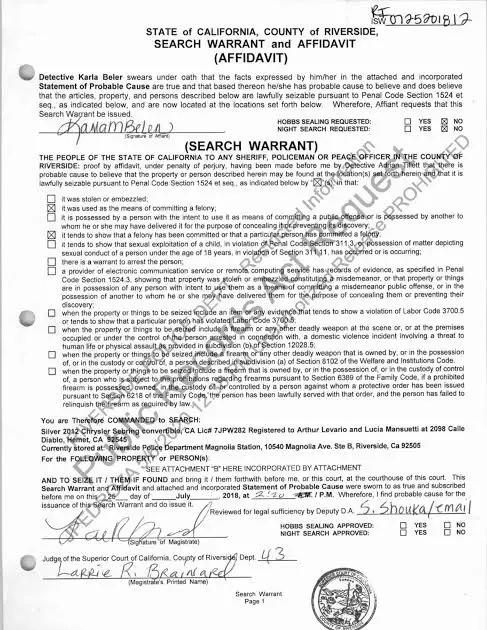Search warrants play a crucial role in the criminal justice system, ensuring that law enforcement officers have the legal authority to conduct searches and seize evidence in pursuit of criminal investigations. You might have been served a search warrant and would want to know what a valid search warrant looks like. In this overview, we would define what a search warrant is, discuss it’s purposes and the basic features that makes up a valid search warrant.
What is a Search Warrant?
A search warrant is a legal document issued by a court that grants law enforcement officials the authority to conduct a search of a specific location, person, or property to gather evidence related to a crime. This document is a crucial aspect of the legal system as it protects individuals’ Fourth Amendment rights, which guard against unreasonable searches and seizures.
To obtain a search warrant, law enforcement officers must provide a sworn affidavit to a judge or magistrate. The affidavit must contain specific information, including probable cause, which is the reasonable belief that a crime has been or is being committed and that evidence related to the crime is likely to be found at the location to be searched.
The process of acquiring a search warrant begins with an investigation. Law enforcement officers collect information, interview witnesses, gather physical evidence, and analyze data. If they have enough evidence to establish probable cause, they can seek the search warrant.
The affidavit for a search warrant should contain details such as the specific location to be searched, the items or evidence sought, the connection between the location or person and the alleged crime, and any additional relevant information. The judge or magistrate reviews the affidavit to determine if the probable cause threshold has been met. If satisfied, they will issue the search warrant, allowing law enforcement to proceed with the search.
Once the search warrant is granted, it must be executed within a specific time frame, usually within a few days. Law enforcement officers must adhere to the terms and conditions outlined in the warrant, including the scope of the search, the authorized hours for the search, and any limitations on the search. It is essential that they act within the confines of the warrant to avoid infringing on individuals’ rights and potentially compromising the validity of the evidence obtained.
Search warrants are not always required in certain situations, such as consent searches, where the individual voluntarily agrees to the search without a warrant. Additionally, exigent circumstances, such as when evidence is at risk of being destroyed or when there is an immediate threat to public safety, may allow law enforcement to conduct a search without a warrant.
Search warrants have a significant impact on criminal investigations and the legal process. They provide a balance between the need for law enforcement to gather evidence and the protection of individual privacy rights. A well-executed search warrant can strengthen the case against a suspect, leading to a fair trial and potential conviction, while an improperly obtained or executed warrant can jeopardize the entire case and lead to the exclusion of evidence.
The concept of search warrants dates back to English common law, and it was eventually incorporated into the legal systems of many countries, including the United States. The Fourth Amendment of the U.S. Constitution explicitly guarantees the right of people to be secure in their persons, houses, papers, and effects against unreasonable searches and seizures. This amendment is the foundation for the requirement of search warrants and is essential in safeguarding the liberties of citizens.
Over the years, search warrants have been the subject of various legal challenges, leading to the establishment of guidelines and limitations on their use. Courts have addressed issues related to the scope of searches, the validity of the probable cause presented in affidavits, and the use of technology in the execution of warrants.
The advent of digital technology has also posed new challenges for search warrants, especially concerning the search and seizure of electronic evidence. Courts have grappled with issues related to data privacy, the scope of searches in electronic devices, and the protection of sensitive information during digital searches.
In conclusion, a search warrant is a critical tool in law enforcement’s efforts to gather evidence related to criminal activities while respecting individuals’ rights to privacy and protection against unreasonable searches and seizures. It requires a careful and thorough process of establishing probable cause and obtaining judicial approval. As technology and legal contexts continue to evolve, search warrants will remain an essential aspect of the criminal justice system, ensuring a delicate balance between law enforcement’s duties and the protection of citizens’ constitutional rights.
Purposes of a Search Warrant
A search warrant is a legal document issued by a court that grants law enforcement officials the authority to search a specific location or premises for evidence related to a suspected crime. Here are five major purposes of a search warrant:
#1. Probable Cause Determination:
One of the primary purposes of a search warrant is to ensure that there is probable cause to conduct a search. Before issuing a search warrant, a judge must review the information presented by law enforcement and determine whether there is sufficient evidence to believe that a crime has been committed and that the specified location is likely to contain relevant evidence.
2. Protection of Fourth Amendment Rights:
In the United States, the Fourth Amendment to the Constitution protects individuals from unreasonable searches and seizures by the government. A search warrant acts as a safeguard against potential abuse of power by law enforcement by requiring them to obtain judicial approval before conducting a search.
3. Preservation of Evidence:
Search warrants are instrumental in preserving the integrity of evidence. By requiring law enforcement to obtain a warrant before conducting a search, the courts can ensure that evidence is collected legally and is admissible in court, making the criminal justice process fairer and more transparent.
4. Scope and Particularity:
Another crucial purpose of a search warrant is to specify the scope and particularity of the search. The warrant should outline the specific location to be searched, the items to be seized, and the reasons for the search. This helps prevent overly broad searches that might violate individuals’ privacy rights.
5. Deterrence of Unlawful Conduct:
The existence of search warrants serves as a deterrent against unlawful conduct. Knowing that law enforcement must have valid reasons and obtain judicial approval before conducting a search encourages individuals to adhere to the law, reducing the likelihood of criminal activities.
While search warrants are essential tools for law enforcement, it’s essential to balance their use with respecting individual privacy and constitutional rights. The proper application and execution of search warrants contribute to a fair and just legal system.
RELATED:
Can You Go To Jail For Not Paying Attorney’s Fees?
How To Tell If Someone Is A Confidential Informant
Why Do Statutes Of Limitations Exist?
Basic Features Of A Valid Search Warrant: What To Look Out For In A Search Warrant
A valid search warrant is essential to protect individuals’ constitutional rights against unreasonable searches and seizures. In this section, we will delve into the fundamental features that constitute a valid search warrant, providing insights into the elements that should be present to ensure its legality and adherence to due process.
1. Probable Cause:
The cornerstone of a valid search warrant is the existence of probable cause. This means that law enforcement must provide credible facts and circumstances that lead a reasonable person to believe that a crime has been committed and the specified location holds relevant evidence. The warrant application should articulate the specific reasons and evidence supporting the request.
2. Particularity of Location and Item Sought:
A valid search warrant must be specific and particular in its scope. It should clearly define the location to be searched and the items or evidence sought. Overly broad or vague warrants that lack specificity may lead to overreaching searches, violating the Fourth Amendment protections against unreasonable searches.
3. Affidavit or Sworn Oath:
A crucial component of a valid search warrant is the inclusion of an affidavit or sworn oath. This sworn statement, submitted by the law enforcement officer seeking the warrant, should affirm the existence of probable cause and the specific grounds for the search. The affidavit should be signed under penalty of perjury, ensuring accountability and truthfulness.
4. Issuance by Neutral and Detached Magistrate:
A valid search warrant must be issued by a neutral and detached magistrate or judge. This ensures that the warrant’s issuance is not influenced by personal biases or vested interests. The magistrate evaluates the affidavit’s contents to determine whether probable cause exists, acting as a check against unwarranted intrusions into individuals’ privacy.
5. Timeliness:
A search warrant must be executed within a reasonable time after its issuance. The validity of the warrant may be questioned if it is executed long after its approval, as circumstances and evidence may have changed, affecting the reasonableness of the search.
6. Limitations on Use of Force:
A valid search warrant should specify the permissible use of force during its execution. Law enforcement officers must exercise discretion and avoid unnecessary use of force, ensuring that the execution remains reasonable and respectful of individuals’ rights.
7. Notice to Occupants:
In most cases, law enforcement must provide notice to the occupants before executing a search warrant, unless exigent circumstances dictate otherwise. This allows individuals an opportunity to cooperate and understand the reason for the search.
Understanding the basic features of a valid search warrant is essential to safeguarding individuals’ rights and maintaining the integrity of the criminal justice system. Probable cause, particularity, an affidavit or sworn oath, issuance by a neutral magistrate, timeliness, limitations on use of force, and notice to occupants are critical components that ensure the legitimacy and legality of search warrants. By adhering to these features, law enforcement agencies can carry out effective investigations while upholding the principles of due process and protecting citizens’ constitutional rights.
Pictorial Samples Of Search Warrants


Last updated on: April 20, 2024




